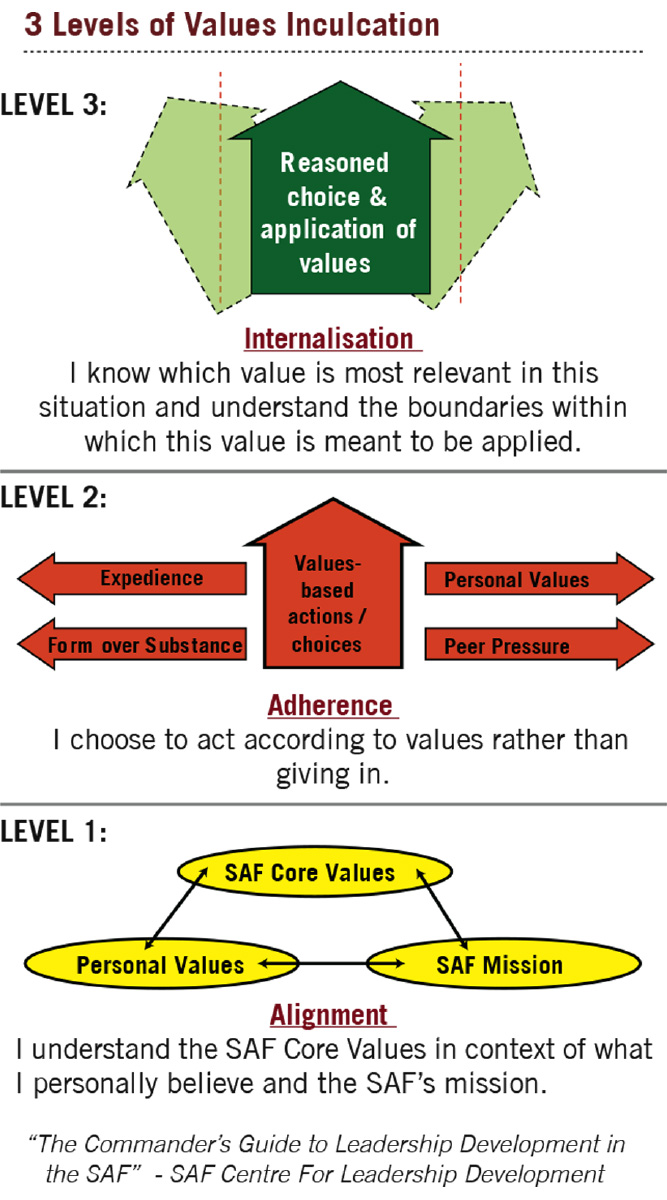A Framework for Understanding the Values Inculcation Process
The figure below is a graphical representation of a framework developed by CLD to clarify the process of inculcating values in the SAF. The framework addresses the purpose and nature of "values inculcation" in the SAF; the components of the "values inculcation" process; the desired outcomes of "values inculcation"; the conditions and "threats" to effective inculcation and application of values in the SAF. Essentially, according to this framework, values inculcation is a continuous process and not just an intervention or activity. It involves 3 levels of understanding:

Level 1: Internalising values through clarification and alignment. We recognise that people join the SAF with their own values. The aim of values inculcation at this level is to engage the individual SAF member in a process of clarifying and aligning his or her personal values to the SAF Core Values. This process requires each SAF member to make sense of the Core Values in the context of the SAF mission and purpose (e.g., why is this Value important in this mission? How does it contribute to the accomplishment of the SAF mission? Will the mission be compromised if I violate the Value?), and internalise the Values as their own (e.g., Do I believe in these Values? Are my actions and decisions aligned to the SAF Core Values?). However, values, clarification and alignment alone are not sufficient as people are only convinced if they see that these values are not just espoused but are used, especially by senior leaders and commanders of the organisation. SAF commanders and instructors must therefore role model the SAF Core Values. Policies must be aligned to the Values. For example, servicemen and women who uphold the Values should be rewarded while those who violate the Values are punished.
Level 2: Understanding the factors that prevent or hinder people from upholding the Core Values. At this level, the process focuses on helping people identify the factors that may prevent them from upholding the SAF Core Values. For example, instead of upholding the Core Values, we may give in to factors such as peer pressure, greed, pragmatism, self-interest, fear and even personal values, commonly faced by the average person. It is therefore important for us to recognise what are the factors that will likely to cause us to fail in our values. To apply values, we must be able to decipher what is right and wrong in the context of the SAF mission, and consciously choose to act according to SAF Core Values. Regular discussion and sharing of everyday-life cases led by experienced instructors or commanders will better prepare SAF personnel, cognitively and affectively, to make better judgements and values-based choices.
Level 3: Making choices through ethical reasoning. At this level, the aim of values inculcation is to equip people with the ability to reason ethically or to be able to make the right choices when faced with ethical or moral dilemmas. People do fail to do the right thing when challenged despite their resolve and commitment to act based on values. One reason is their lack of ethical reasoning skills to deal with ethically challenging situations or values-related dilemmas such as right vs. more right issues. In today's complex operating context, it is vital to equip SAF personnel in ethical reasoning. Our people cannot afford to just know the SAF Core Values and hope that by knowing what these Values are, they will be able to make the right decisions. They must be able to identify the Value that is most relevant to a particular situation (e.g., in a peacekeeping mission), and understand the boundaries within which the Value is meant to be applied or interpreted in context.
Additional Resource(s) Here: